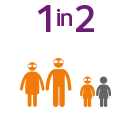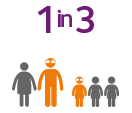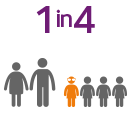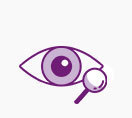Myopia explained
Understanding short- sightedness in children.
Signs of myopia.
What causes myopia?
What causes myopia?
There are two main factors which can mean your child is more at risk of developing myopia - genetics and lifestyle
Genetics
Myopia in children increases when parents are myopic1 The risk is nearly:

When both parents are myopic.

When one parent is myopic.

When neither parent is myopic.
Lifestyle
Modern lifestyles may influence the development of myopia.

Prolonged near tasks such as reading and gaming on portable devices.2,3

Low levels of outdoor activity.2,3

Poor lighting levels.2,4
Signs to look out for
Distance vision becoming blurry
Move closer to the TV
Poor concentration
Complaints of headaches
Poor lighting levels
Tired eyes
Squinting or screwing eyes up
Reduced performance at school
Ready to take on myopia?

Spend at least 90 minutes outdoors5

Book an eye examination for your children*

Discuss myopia management with your Eye Care Professional
*Regular eye examinations for young children are important to identify and treat myopia early. this may help to reduce the final prescription and the potential risk for future eye health issues
1. Morgan P. Is Myopia Control the Next Contact Lens Revolution? The Optician 2016.
2. Wolffsohn JS, Calossi A, Cho P, et al. Global Trends in Myopia Management Attitudes and Strategies in Clinical Practice. Cont Lens Anterior Eye. 2016;39:106-16.
3. Glifford P, Glifford KL. The Future of Myopia Control Contact Lens Optom Vis Sci.; 93:336-43.
4. Rose KA, Morgan IG, Ip J, et al. Outdoor Activity Reduces the Prevalance of Myopia in Children. Opthalmology 2008; 115:1279-1285.
5. IMPACT OF INCREASING PREVALANCE OF MYOPIA AND HIGH MYOPIA The impact of myopia and high myopia a Report of the Joint World Health Organisation - Brien Holden Vision Institute
Global Scientific Meeting on Myopia THE IMACT OF MYOPIA AND HIGH MYOPIA University of New South Wales, Sydney, Australia 16-16 March 2015
SA13020














